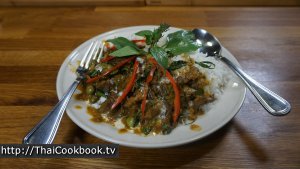Authentic Thai Recipe for
Panang Beef Curry
Authentic Thai Recipe for
Panang Beef Curry
แกงพะแนงเนื้อ (Kaeng Panang Nuea)
Currently rated: ![]()
Rated 4.5 Stars from 5373 reader reviews
First published on May 7, 2016
Recipe by W. Tipsuwan
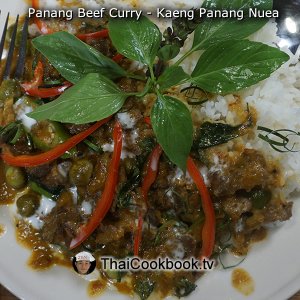
Yield: 2 servings
Prep time: 5 Minutes
Cooking time: 5 Minutes
Ready in: 10 Minutes
Ingredient List:
- 1 Cup thinly sliced Beef Steak
- 2 Cups Coconut Milk
- 2 Tbsp Panang Curry Paste
- 2 Tbsp Coconut Sugar
- 1 Cup Thai Sweet Basil
- 1/2 Cup Pea Eggplant
- 2 Mild Chilies
- 3 Kaffir Lime Leaves
- 2 tsp Thai Fish Sauce
About my Kaeng Panang Nuea:
About my Kaeng Panang Nuea:
If you've been following my recipes lately, then you'll remember seeing how I made up some homemade panang curry paste to store in my freezer. In this recipe I show you how to use some to make an excellent beef panang curry over steamed rice. Panang is one of the most popular types of curry in Thailand, and because it is generally considered to be more mild than other curries, it can be enjoyed by people who do not normally eat spicy foods. Panang has the distinct flavors of mace, cardamom, cumin, and coriander seed. It has rich golden orange to brown color, depending on the kind of meat used.
Step by Step Directions:
Step by Step Directions:
How to Make Kaeng Panang Nuea
How to Make Kaeng Panang Nuea
Step 1
For this recipe I'm using some of the homemade curry that I made last month and kept in my freezer. I just take it out and thaw in a little water for a few minutes. You can do this recipe with a packaged curry and it will come out fine, though I highly recommend you try to make the whole dish from scratch if you have time. Packaged curry pastes can be very salty, so be careful with the amount of fish sauce you add when seasoning the curry at the end. Taste it first, and you can leave the fish sauce out if it already has plenty of salt.
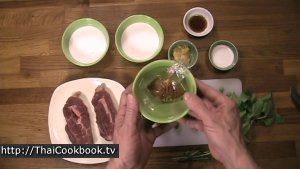
Step 1
I use beef steak for this dish, and cut it into long strips first, then turn the strip on the side so I can slice it very thinly across the grain. Done this way it will stay very tender when cooked. Cut away any fat, skin, or tendons and save those for the dog.
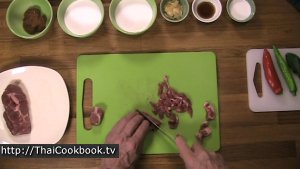
Step 1
Put the meat in a bowl and add about 1 - 2 teaspoons of light soy sauce. Mix it in well and let it sit for about 10 minutes, while you prepare the rest of the ingredients.
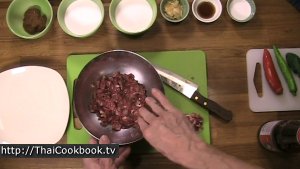
Step 1
We use Horapah, the type of basil that is commonly known as Thai sweet basil, or Star of Siam when making curries and other Thai foods that have very strong spices. It is important to have that type or the flavor of your curry will not be correct. Pluck the leaves and flower tops, saving a few nice pieces aside to use as a garnish.
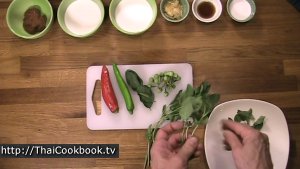
Step 1
Pluck the pea eggplants from the stems and clean them well. Pea eggplant is often used in this type of dish. If you don't have them, you can leave the out.
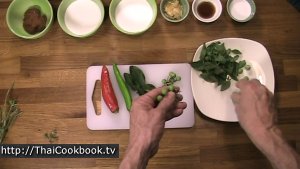
Step 1
Tear the center stems from 2 of the kaffir lime leaves, then tear them into a few smaller pieces.
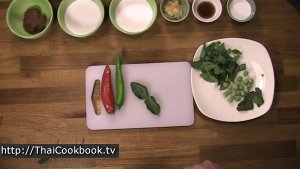
Step 1
Fold the other kaffir leaf in half on the stem, then slice it into very thin slivers.
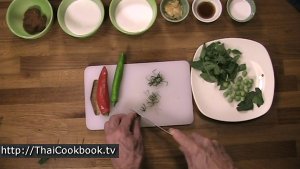
Step 1
Slice the mild green chili diagonally.
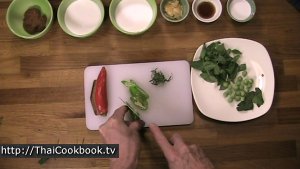
Step 1
Cut the mild red chili in half, lengthwise, Remove all the seeds, then slice it into long thin slivers or like julienne style.
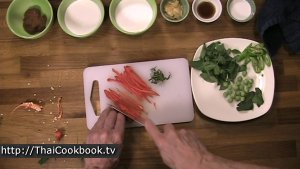
Step 1
In a large wok or pan, heat half the coconut until bubbling, then cook, stirring continuously for about 5 minutes or until thick and oily.
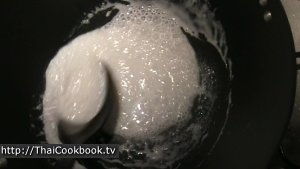
Step 1
Add the curry paste, stir it in well and cook for about 2 or 3 minutes.
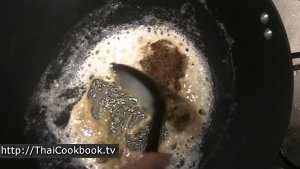
Step 1
Fry the curry until it is quite dry, thick and oily.
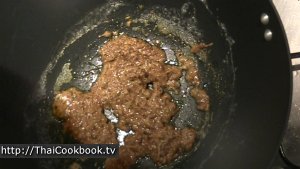
Step 1
Add the meat to the curry, stir it in well, and fry together until the meat is nearly done.
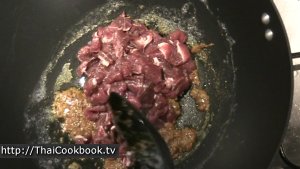
Step 1
Add the second portion of coconut milk and stir it in well.
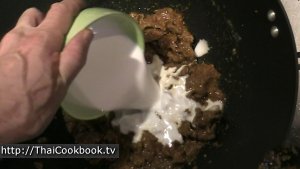
Step 1
Add the pea eggplants
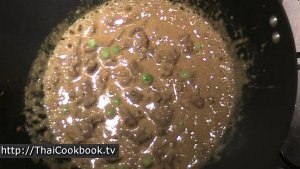
Step 1
Add the coconut sugar and continue stirring until completely melted in.
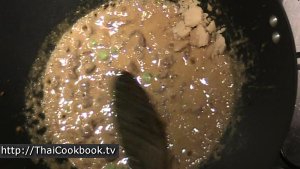
Step 1
Add the green chili.
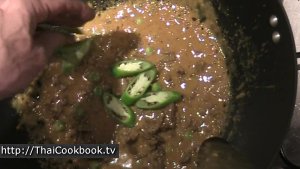
Step 1
Taste the curry for the correct flavor.
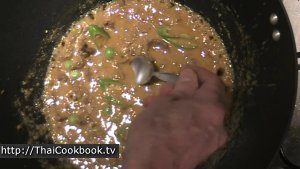
Step 1
If you think it needs salt, then add a few drops of fish sauce at a time until you get a balanced taste that tastes right to you. You may not need to add the fish sauce at all.
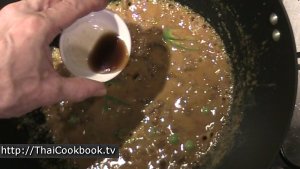
Step 1
Add the kaffir lime leaf pieces.
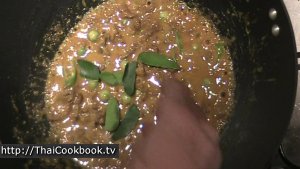
Step 1
At any time you can add a little water if the curry gets dry. You want it to be nice and creamy.
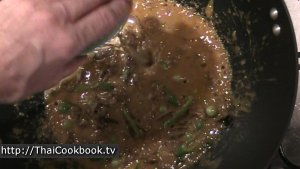
Step 1
Turn off the heat, add the basil and toss together lightly.
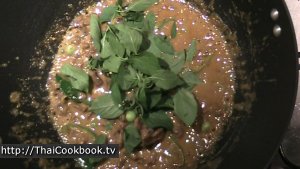
Step 1
For one-dish meals, serve on a plate with steamed rice, or serve it in a bowl to be shared at the table.
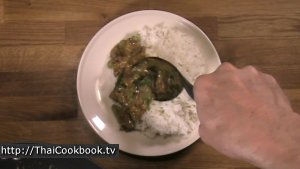
Step 1
Sprinkle some of the kaffir leaf slivers all around, lay the red pepper on where it looks nice.
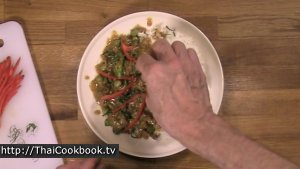
Step 1
Drizzle a couple of teaspoons of coconut milk over the curry for added favor and creamy color effect.
